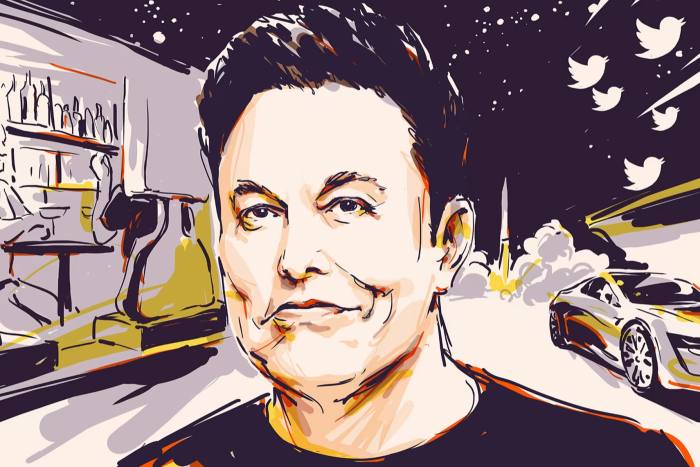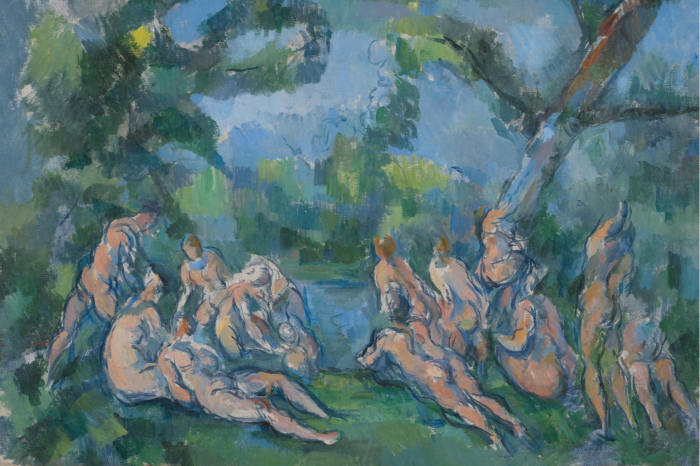Kanye West and the age of the unmanageable
“This is an unmanageable situation,” announced Ye (formerly known as Kanye West) at around the 96th minute of the introductory preamble to the ninth collection of his clothing label Yeezy on Monday night. He was speaking in a theatre, in the manner of a church minister. His congregation? A select group of magazine editors, stylists and various designer peers.
“You can’t turn the music lower,” he went on, in regards to the show’s lateness, his travails with previous collaborators and his mission to create a fashion moment “that you will not be able to un-Google”. “This is a god thing,” he claimed, in his “White Lives Matter” T-shirt and sparkly flip-flops. “A dream that can’t happen without the help of God.” A choir of infants started singing songs a cappella. A model shuffled on to a crepuscular catwalk to walk among us, head-to-toe covered in a knitted all-in-one.
The mood felt edgy, unpleasant and pretty stupid. Or at least, I felt pretty stupid for having been at the show at all. What possessed me to turn up for a rightwing controversialist who continually talks about his “genius”? Shamefully, my FOMO was such that I couldn’t bear to be the one who wasn’t there.
Besides, big messianic energy seems to be in favour. And not just around the fashion shows. Right now, you’re no one unless you’re on a mission, commanding fulsome and unequivocal devotion. The tale of Ye, a rapper espousing his journey dressed in a mantle of white supremacy, was only one example in a long week of crazy. Elsewhere the UK prime minister was trying to convince us that she cared for social justice while sending the pound into the vortex, while Vladimir Putin’s game of global brinkmanship is pushing us towards the spectre of a nuclear attack. What the actual hell?
Unmanageability is the new world order. No one is playing by the rules. Guidelines and protocols are just so boring. We’ve reached that moment in our evolution where it seems people in power just do whatever the hell they want to, no matter how bizarre, unhinged or ill-behaved.
The failure to auto-correct extreme behaviour has been trending. It’s not that long since we witnessed the Capitol insurrection after all. Was that the moment, in that swarm of raccoon-clad revolutionaries, that our collective sanity went out the window? From the ridiculous to the truly nasty, in the months since we’ve seen a cavalcade of dramas, from the Johnny Depp trial to the scandal of Harry Styles’s “Spitgate” to Elon Musk challenging Vladimir Putin to a “single combat” duel. Toxic stories have led the headlines for so long now that it feels like there’s no sane human left behind the steering wheel.
That we are becoming more volatile and erratic was observed earlier this year by the critic Wesley Morris, reacting to the Will Smith Oscars slap debacle in the New York Times. He claimed that one of the more pernicious outcomes of Covid was not the virus that was “at its center . . . of the body”. But how the pandemic has ended up “costing us our minds”.
Smith’s excruciating behaviour at the Dolby Theatre, he argued, was the manifestation of a greater ill. We are slowly and irrevocably unspooling, he suggested. “We’ve been made privy to all kinds of behaviour we’d rather not see.”
Lewis R Gordon is an American philosopher whose book Fear of Black Consciousness was published earlier this year. In 2018, he was interviewed for an article about Kanye in which he tried to explain the singer’s drift to the right following a controversial interview the musician had done on TMZ about the history of slavery. “It’s pretty clear that his psychological protection against vulnerability is to push himself to the level of a god,” said Gordon. “People who build up an edifice of pleasing falsehoods to protect themselves eventually lose the connection to certain elements of truth.”
Power, fame and influence all come with costly baggage. And while Gordon speaks specifically of the black experience, his thinking reveals broader themes. When I wrote to Gordon this week, he told me: “I do think West’s views are symptomatic of a broader crisis . . . The backlash against progressive efforts, especially regarding race and gender, is so brutal that there has been a return of the ‘exception’ rule. The second is across races, in which there are fewer people seeking political solutions to political problems; they are instead seeking ‘gods’ . . . The lure of famous people with god-complexes is that their ‘fame’ is transformed into their ‘divinity’. The larger disorder is that there are people without fame who seek it through identification and projection (‘touch the hem of his garment’, which has additional meaning in the case of this week’s silliness).”
Often, when we find ourselves in a place of weakness, we protect ourselves by becoming more entrenched. And with everything so polarised and angry, people are quick to lose their heads. We’re also more susceptible to easy credos and slogans that make us feel empowered. As the world becomes more heated and divisive, the messianic impulse has taken hold.
Like many who have wielded power and influence, Kanye now finds himself standing on a tiny stage. And while his show felt dangerous in its megalomania and weirdness, the world seemed just as “unmanageable” when I finally escaped outside.
Email Jo at [email protected]
Best of FT Weekend
LUNCH WITH THE FT: ELON MUSK

The Tesla chief talks to FT editor Roula Khalaf about moving to Mars and saving free speech
Cézanne — Tate Modern’s blockbuster

Jackie Wullschläger on how the artist shaped the creation story of modern art
Find out about our latest stories first — follow @ftweekend on Twitter
For all the latest Business News Click Here
For the latest news and updates, follow us on Google News.

